The digital landscape is significantly different in 2012 from what it was even as recently as 2008 — and the dramatic growth in the use of social networking sites such as Facebook or Twitter over that time period is a big part of the story. When we conducted our first survey of online civic engagement in 2008, some 33% of online adults used social networking sites such as Facebook, and just 6% said they used Twitter or similar microblogging services. Four years later, 69% of online adults say they use social networking sites such as Facebook and 16% use Twitter, which means that 60% of all U.S. adults now use some sort of social networking platform.
As social networking sites have become more common, users now engage in a range of activities around political or social issues within these online spaces — from encouraging their friends to vote or suggesting political content to others, to joining issue-oriented groups or following the posts of politicians or other public figures. In our 2012 survey we asked about eight different politically oriented behaviors that users might take part in on social networking sites, and some 66% of SNS users said that they had done at least one of them in the past year. We refer to this group as “political social networking site users,” and they comprise 39% of the total U.S. adult population.
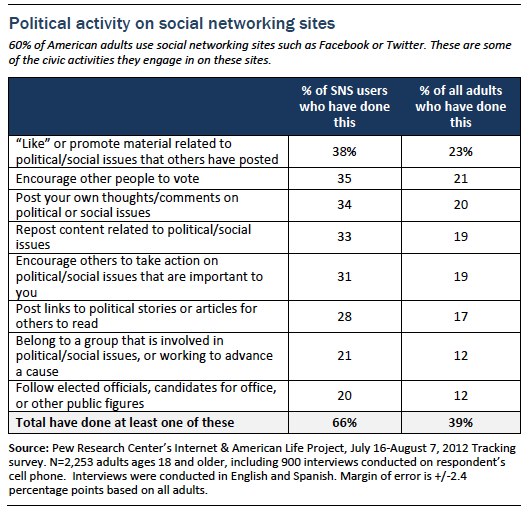
Some 24% of political social networking site users did just one of these eight activities, while the remaining 76% did multiple activities. The median political SNS user engaged in three of the eight activities outlined above.
Because social networking sites were a modest component of our 2008 study, we do not have trend data available for all of these activities over the full four-year period. However, we did ask similar questions about a subset of these behaviors that illustrate the growing importance of social networking sites as a place for activism and discussion about social or political activities:
- In 2008, 11% of social networking site users said they used these sites to post political news for others to read. In 2012, 28% of users said they posted links to political stories or articles and 33% said they reposted other types of political content on these sites.
- In 2008, 12% of social networking site users said they had friended a political candidate on these sites. In 2012, 20% of users said they have friended or followed a candidate or similar political figure.
- In 2008, 13% of users said they had started or joined a group on a social networking site organized around political or social issues. By 2012, the proportion of social networking site users who do this had risen to 21%.
Demographics of political engagement on social networking sites
Among Americans who use social networking sites, political activity on online social networks is common across a wide range of subgroups. Indeed, a majority of social networking site users in every demographic group — including seniors, those who have not attended college, or those with low household incomes — use these sites to engage in political activities or discussions. However, these behaviors are especially prevalent among the youngest users and those who have attended college.
When looking at political engagement on social networking sites across the entire population, certain differences are more pronounced because some groups are more likely to use social networking sites in the first place. For example, young adults are far more likely to be social network users than seniors —93% of all 18-24 year olds use social networking sites, compared with 23% of those 65 and older. So although 57% of social networking site users in the 65+ age group engage in political activity on these sites, that means that just 13% of all people ages 65 and older are politically active on these sites. By contrast, two-thirds of all 18-24 year olds are politically active in social networking spaces.
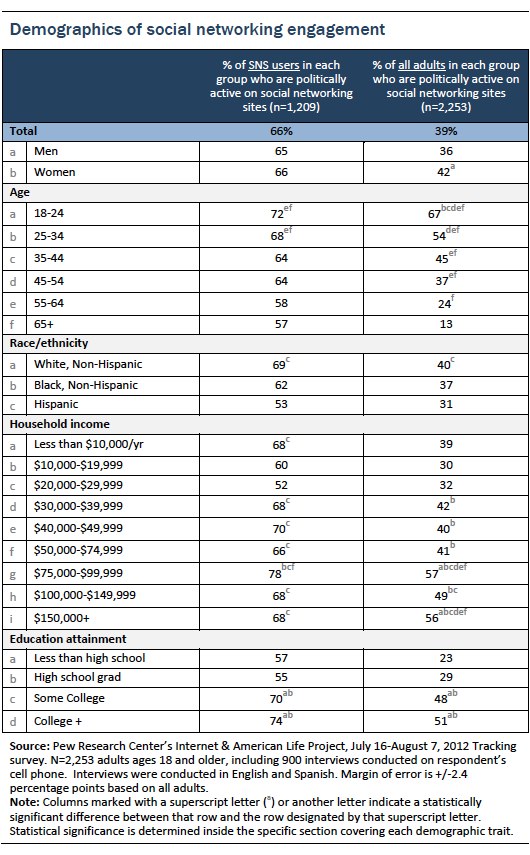
When it comes to party identification, Republicans and Democrats are equally likely to use social networking sites for political activity (this is true both whether comparing users to users, or comparing the prevalence of this behavior within the overall population of Democrats and Republicans). However, liberals are a bit more likely than conservatives to take part in political behaviors on these sites. And among SNS users, conservative Republicans and liberal Democrats tend to be more active on these sites than less ideologically affiliated users (moderate/liberal Republicans and moderate/conservative Democrats).
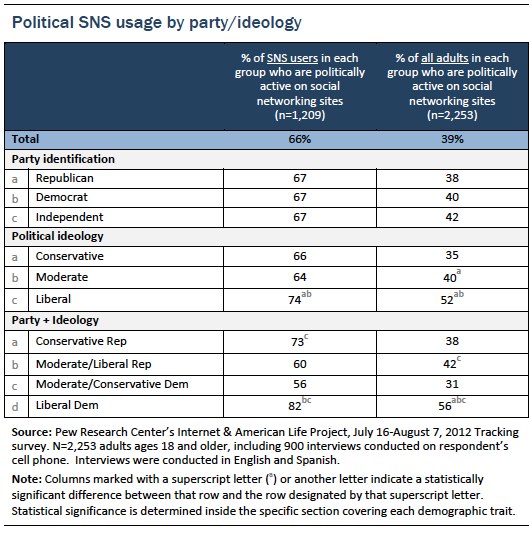
Social media conversations can spur deeper interest and involvement in political/civic issues.
Discussions of political or social issues on social networking sites can spur users to get more involved or learn more about those issues. These actions can be encouraged by discussions among friends, as well as from posts made by organizations or public figures.
Some 43% of social networking site users say they have decided to learn more about a political or social issue because of something they read about on a social networking site. This group is evenly split between those who were first introduced to the particular issue by people they know personally, and those who were first introduced to the issue by someone outside their immediate friend circle:
- 12% of users said they decided to learn more about an issue because of something they heard from someone they know personally.
- 7% of users decided to learn more about an issue because of something they heard from someone they don’t know personally such as a public figure or organization.
- 22% of users said they decided to learn more about an issue after hearing about it from both people they know personally and people they do not know personally.
- 2% decided to learn more about an issue because of something they read on a social networking site, but could not remember who they first found out about the issue from.
The remaining social networking site users (representing 56% of the total) say they have never decided to learn more about an issue based on things they read on these sites.
A smaller but still notable number of social networking site users — 18% — say that in the last year they decided to take action involving a political or social issue because of something they read on those sites. This group was also evenly divided between actions taken at the behest of personal friends and actions taken at the urging of organizations or public figures:
- 5% of users said they decided to take action on an issue because of posts by someone they know personally.
- 4% decided to take action because of posts by someone they don’t know personally, such as a public figure or organization.
- 8% decided to take action because of posts from people they know personally and people who are not part of their immediate friend circle.
- 1% could not remember who they first found out about the issue from.
The remaining social networking site users (representing 82% of the total) say they have never decided to take action on a political or social issue because of something they read on these sites.
Generally speaking, SNS users who say that social network conversations have directly inspired them to learn more about an issue or take some kind of political action tend to be highly engaged in many aspects of the political process. Compared with SNS users who have not been directly inspired in this way, they are more likely to be registered to vote; more likely to take part in political activities outside of social networking spaces; more likely to talk about politics with others; more likely to make political contributions; and more likely to receive frequent political communications or mobilization messages.
Demographically, age and educational attainment are the primary dividing lines when it comes to learning more about political or social issues based on social network chatter. Just under half of social network users ages 18-49 say they have decided to learn more about an issue due to information they encountered on a social networking site, compared with around one in three users ages 50 and older. Similarly, some 52% of college graduates who use social networking sites have done this, significantly higher than the 38% of high school graduates and 41% of those with some college experience (but not a degree) who have done so.
Similarly, when it comes to taking action on a political or social issue, those with higher levels of education (college graduates and those with some college experience) again stand out from the less well-educated. However, social network users of all ages are equally likely to say they have taken action because of things they have read or heard on these sites.
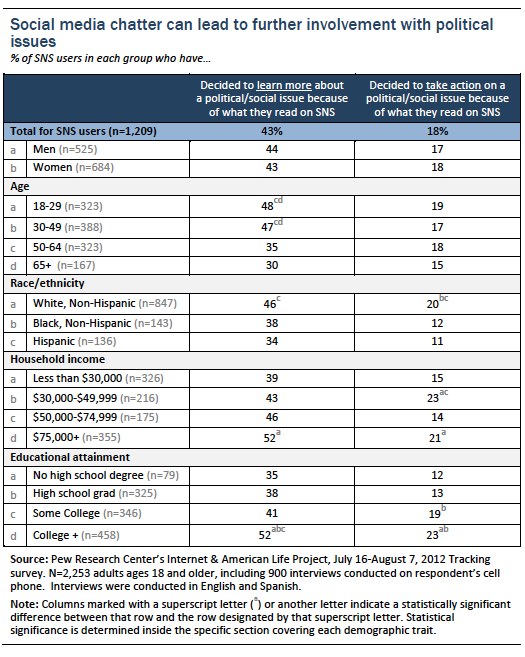
Democratic and Republican SNS users (as well as liberal and conservative users) are equally likely to say they have decided to learn more or to take action on a political issue based on something they read on a social networking site. SNS users who are conservative Republicans and liberal Democrats are especially likely to have taken action on a political issue based on something they saw on a social networking site compared with moderate/liberal Republicans or moderate/conservative Democrats (21% of SNS-using conservative Republicans and 27% of SNS-using liberal Democrats have done this).
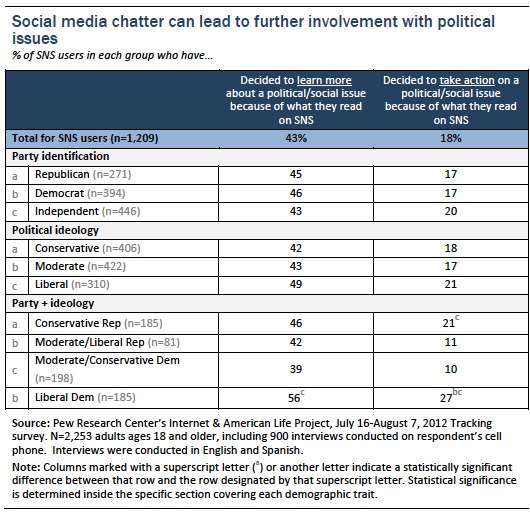
Politically active social network users are frequently — but not universally — engaged with other aspects of civic life.
Political social networking site users (that is, the 39% of Americans who have recently done one of the eight general SNS-and-politics-related activities we asked about in this study) are also likely to be engaged in other forms of political and civic activity that occur somewhere other than social networking sites:
- 63% of political SNS users have recently taken some kind of “real world” action around political or social issues, such as attending a political meeting or working with fellow citizens to solve a problem in their community (48% of all adults have done so)
- 60% have expressed their opinion about a political or social issue via online channels (for example, by sending an email to a government official, or signing an online petition). This compares with 34% for the population as a whole.
- 53% have expressed their opinion about a political or social issue via offline channels (for example, by sending a letter to a government official, or signing a paper petition). This compares with 39% for the population as a whole.
- 20% have made a political contribution of some kind, whether online or offline. This is similar to the 16% of all adults who have done so.
Taking all of these together, some 83% of “political SNS users” also got involved in political or social issues in one way or another outside the bounds of social networking sites themselves. And compared with people who use social networking sites but do not get involved in political discussions within these spaces — or to those who do not use social networking sites at all — these politically active social network users stand out as being highly active in nearly all facets of their civic lives. They are significantly more likely to regularly talk about politics with others offline; to speak out about political subjects both online and offline; to get involved in political activities or groups; and to be regularly contacted by political parties or other organizations.
In discussing these differences, it is important to note that we cannot say for certain that this greater involvement in civic actions and behaviors is directly caused by people’s experiences or interactions on social networking sites. Indeed, the causal mechanism may in fact work in the opposite direction, such that people who are already active or engaged in political/social causes make use of social networking sites as another outlet for their existing interests.
What we can say is that a clear correlation exists between the use of social networking sites for political activity and engagement in a wide range of civic behaviors — in both the online and offline realms. The political actions that people take on social networking spaces have significant overlap with the political actions they take in other aspects of their lives.
Indeed, this correlation between online and offline political activity is true more generally. Individuals who are politically active on social networking sites are also highly active in offline spaces, and those who are politically active offline tend to have relatively high rates of engagement in social networking spaces. But this report is especially interested in how new technologies are used by people as they engage in the political process, and as a result we are focusing our analysis on trends in social networking engagement rather than those in other areas.
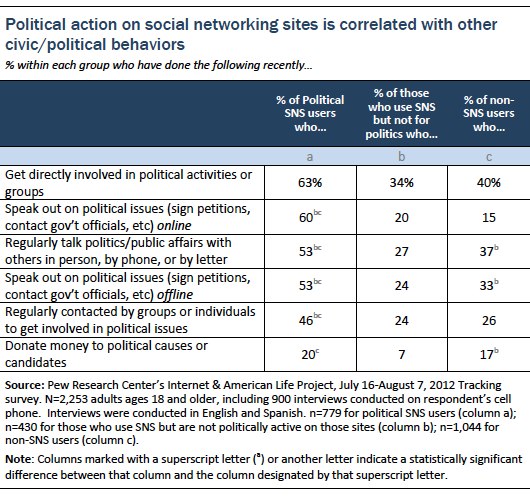
Those whose political activity occurs only in the context of social networking sites look very different from other political SNS users.
As noted above, 83% of “political social networking site users” take part in actions related to political or social issues in other venues (either online or offline). Of course, this means that 17% of these political SNS users (representing 8% of the total population) do not engage in any of the other behaviors we asked about and take part in political actions only within the context of social networking sites. In the final section of this chapter, we examine the unique characteristics of this particular group.
Compared to those who extend their political involvement into realms other than social networking sites, these “SNS-only” users differ in a number of important ways. Demographically, they are significantly younger and have lower levels of income and educational attainment than those who take part in political actions on social networking sites as well as other venues. They are also significantly less likely to talk about political issues in other online spaces, and to receive political communications from other people or organizations (although both groups are equally likely to talk about politics with others in offline spaces).
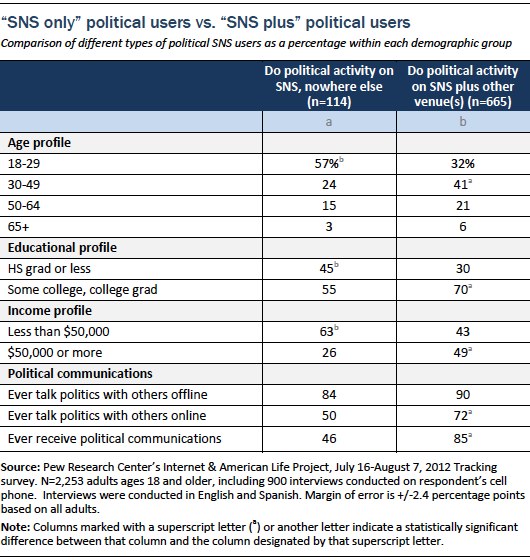
In terms of their political beliefs and partisan leanings, “SNS-only” political users are a bit of a mixed bag. They are similar to political SNS users who branch out into other forms of political behavior in terms of their ideological leanings; and while they are a bit less likely to describe themselves as Republican, they are also more likely to say that they do not identify strongly with any party in particular (some 22% of these “SNS-only” users do not lean towards either party, compared with 12% of the “SNS-plus” group). Interestingly, they are more likely than their “SNS-plus” counterparts (by a 16%-5% margin) to strongly agree with the statement that “most elected officials care about what people like me think.” But overall, there are no clear partisan or attitudinal trends within this group.




